Getting Off of Sugar: An Interview with Margaret Floyd
May 16, 2013, Updated Sep 01, 2017
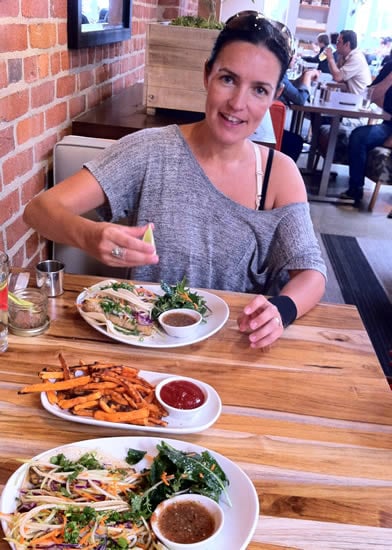
Last week I had lunch with my friend Margaret Floyd, a Nutritional Therapy Practitioner and author of Eat Naked. (You may remember her from her October Unprocessed guest posts, The Salad Dressing Formula and The Superfood Secret to Making Homemade Condiments Last for Weeks.)
You probably know I’ve been railing against added sugar lately (not just high fructose corn syrup) – and especially how it is being added to more and more foods, using more and more names. As much as I enjoy a sweet treat from time to time, “sneaky” sugar has become one of my bigger pet peeves.
After our lunch, I sent Margaret a list of questions about sugar. I hope you’ll get something out of her answers below.
—
Andrew: There are so many different things that are pervasive and harmful in the Standard American Diet. Why do you focus on sugar?
Margaret: I don’t think anyone’s under any illusions about sugar – it’s hurting us on every level. There isn’t a disease or health condition out there that isn’t exacerbated by sugar. But you could say that about trans fats as well, so why sugar? The main reason is that sugar is ubiquitous. It’s in everything processed – even “healthy” processed (if there is such a thing). When you remove sugar from the diet, by default you end up taking out all the other harmful aspects of processed foods, because you’re forced to eat strictly whole, real foods.
A: You use the term “sugar” a bit more broadly than other people. Can you elaborate?
M: When I talk about sugar, I’m not just talking about what we sweeten our coffee with. I’m talking about anything that converts to glucose (sugar) quickly in the blood, thus spiking insulin levels. In moderation, insulin is a very important hormone. But in excess, it drives inflammation, it drives fat storage, and it is the pathway to more serious blood sugar handling issues such as metabolic syndrome and diabetes.
So yes, I’m referring to table sugar, but it’s also anything “starchy”: potatoes, all grains (even whole grains), and most fruit. I also include anything that has an “insulinemic” effect (this means it raises insulin levels even in the absence of an increase in blood glucose) such as dairy and non-caloric sweeteners (there’s been some research showing that even the taste of sweet can initiate an insulin response).
I also include any carbohydrates that are metabolized by the liver in a way that stresses it – fructose falls into this category, as does alcohol.
A: So it sounds like you’re talking about the “Paleo” diet?
M: Well, it’s close to the Paleo diet, but not identical. For example, we allow legumes, which are typically eliminated in the Paleo diet. These are what we call “slow carbs” – yes, they’re starchy, but their fiber and protein slow down the blood sugar spike, so we include them on the cleanse. They’re a great way to get that starchy feel without the impact on blood sugar levels. And we haven’t seen any adverse reactions by including them.
A: You told me that it’s really important for someone who is getting off of sugar not to have the taste of anything sweet during their detox — so that means artificial sweeteners are off-limits, too. Why?
M: As I mentioned earlier, there’s been some research showing that even the taste of sweet can initiate an insulin response – this means you’ll have the negative physiological reaction even without the calories or the actual sugar. But even without an insulin response, having the taste of sweet on our tongue maintains its dominance on our palate. A key aspect of any successful sugar detox is to re-sensitize yourself to flavor. One of the bonus side effects of our cleanse is that food tastes amazing. You can taste the natural sweetness in foods that previously seemed bland, and the whole array of flavor profiles – bitter, sour, tangy, sweet, spicy, salty, and so on – will come forward in a whole new way. Simply put: you’ll taste more.
This is also a key aspect of the sustainability of this cleanse. That sweet treat you love so much will be almost intolerable after the cleanse. It makes it much easier to maintain the benefits.
Also – artificial sweeteners have their own set of issues neurologically (Amazon affiliate link). Even the natural alternatives such as stevia have typically been so highly processed that they’ve lost their nutritional value, so we don’t recommend them.
A: I get this question a lot from my readers, so I’m curious to know your answer: Do you ever use added sweeteners in your food? If so, which do you prefer? Which do you avoid?
M: I do, just very minimally. It’s the exception and treat, not the rule. If it’s something cold, I like raw honey. It’s got great health benefits outside from just the sweetness. If I’m sweetening a sauce or a smoothie, I like to use a couple of raw dates. This is a trick my chef husband taught me. You get all the fiber and nutrients from the dates, as well as their sweetness.
For baking we typically coconut sugar (palm nectar, dehydrated). It’s unrefined and has a low glycemic impact.
I avoid anything highly processed like the plague. And I avoid agave nectar, which surprises a lot of people. Agave nectar – even truly unrefined, raw agave (which is extremely hard to find; most “raw” agave is anything but) – is extremely high in fructose. It’s higher in fructose than high fructose corn syrup! And fructose is exceedingly damaging (Amazon affiliate link). It’s the most toxic sugar in our food supply. It is metabolized by our liver putting a tremendous amount of stress on it, and is on the fast track to fat storage in our bodies. In whole fruit and small doses, it’s fine. But agave isn’t whole nor does it have the benefit of the fiber to slow down its absorption.
A: Some folks are now claiming that sugar is as addictive as heroin or cocaine. Hyperbole?
M: It does sound extreme, but in fact sugar trigger the same pleasure centers in the brain as do heroin and cocaine, and it is exceedingly addictive. If you look at the seven criteria for substance dependence put forward by the ADA (American Psychological Association), I think you may recognize them as pervasive in many people’s relationship to sugar. They are:
- tolerance (you need more to get the same effect)
- withdrawal (experience physical or psychological symptoms when use stops)
- bingeing (use more of the substance or use it longer than you intended)
- desire or attempts to cut back or quit
- craving or seeking (an “intense drive to self-administer”)
- interference with life
- use despite negative consequences
Now just like with any addiction, not everyone is going to be as susceptible to its grasp. Just like some people can have a glass or two of wine without a problem, some people can give up sugar easily. But for many, without a very specific program and lots of support, giving up sugar is no joke and exceedingly difficult.
A: How can someone know if they have trouble with sugar?
M: There are a lot of different ways to tell if you’ve got some blood sugar handling issues. The key ones are:
- you crave sweets generally (yes, it is possible to live without sugar cravings!)
- you crave coffee or sugar in the afternoon, and/or you get sleepy in the afternoon
- you get irritable, shaky, or a headache if a meal is delayed or skipped. I call this ‘cranky hungry beast’ syndrome and let me tell you I know this one well
- you wake up a few hours after going to sleep, and have a hard time getting back to sleep
- you tend to binge or eat uncontrollably
- you can’t imagine life without one or more of the following: dessert, chocolate, bread, rice, pasta, alcohol, coffee…
A: Hang on there. I can’t imagine life without chocolate, bread, or alcohol… Those are foods I truly enjoy and really wouldn’t want to live without those. Do you mean I’d have to cut those out completely? (For a couple of weeks, sure, but forever? You may be losing me here…)
M: Haha! No, I don’t mean forever, but I do mean drastically reduced and as a special treat rather than on a daily basis. None of these things contribute much nutritional value to our diet, in fact, none of them are nutritionally required. We can live quite easily, fully, and healthfully without them (this comes as a surprise to many people). And all of them are contributing to blood sugar handling issues in their own ways.
All that said, I am a big believer in moderation and I have an 80:20 rule that I live and swear by. If you told me I could never have ice cream again I might punch you. As long as you’re steering clear of this stuff most of the time, then the occasional treat isn’t going to hurt you.
A: What advice do you have for my readers who are trying to reduce their sugar consumption?
M: You know, I’m usually a big proponent of baby steps, but with sugar you need to get aggressive. Baby steps will drag out the process in a way that makes it harder for longer. I’m a big believer in doing an aggressive sugar detox – either ours or another – that’s assisted and supported so that you have someone to go to for support along the way. I like to think of it like a chiropractic adjustment for your blood sugar handling. The majority of people are able to have major breakthroughs and results after two weeks; for some it takes a bit longer.
After two weeks without anything in your diet that converts to sugar quickly in your blood, it’s remarkable how good a person can feel.
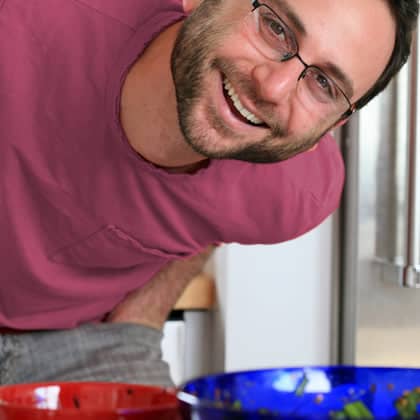
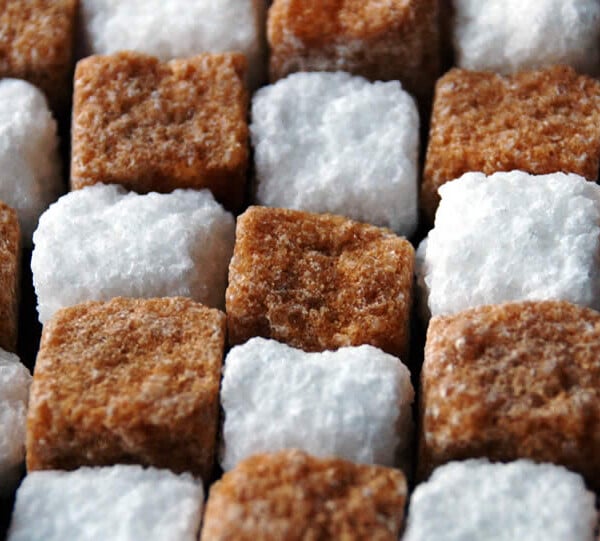
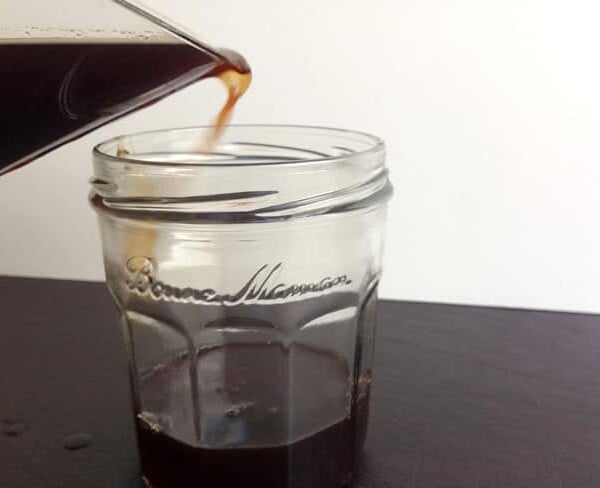
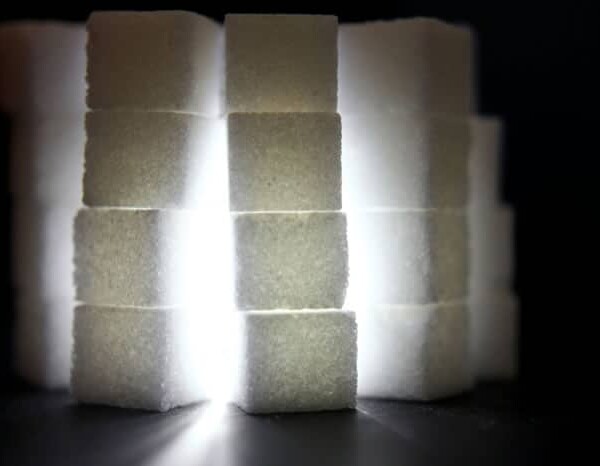
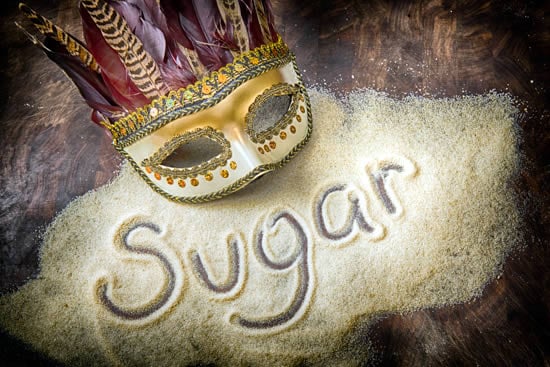















Great interview! Ive just finished my first whole30 and loved it! No sugar is the way to go, (although not forever)! I just hope I can keep it to a minimum.
Great interview Andrew! I learn so much from you! Just wondering… I’m breastfeeding, and I wonder if I could do the sugar detox? Would it influence the breastmilk? I know general detoxes are not recommended because the toxins are eliminated through breastmilk too. Any thoughts?
Hi Aneta, great question. (and congratulations!!) I, too, am breastfeeding and it’s actually the only detox you can do while breastfeeding. Now, there are a couple of considerations that will apply to you that won’t apply to other folks – you’ll want to watch your milk supply (most of the time it’s unaffected – sometimes it reduces a little depending on how much dairy you currently consume, and we can easily tweak the protocol so that you still get results but bring supply back up to normal) and also depending on how much sleep you’re getting, the rough days may feel a little rougher. We’ll give lots of support for this situation specifically throughout the program. How many months old is your little one? I’d recommend waiting until she/he is at least 3 months old – mostly for your sake. Many moms find they love this protocol for themselves and… Read more »
Great post, Andrew! My husband and I have been researching sugar for the past few months, and you’ve really helped us figure a lot of things out with your posts on sugar, especially for OU!
But she also wants us to eliminate potatoes and whole grains?
Granted, starch is “a sugar” in the chemical sense, but does she really think starches are unhealthy?
I almost never sweeten coffee or tea (except for chai, every couple months or so). Sure, added sugar is unnatural. If she inveighed against modern, extremely hybridized wheat as opposed to emmer, kamut, century-old “heritage” wheat varieties . . . I’d see some sense to it. Altho that still leaves a lot of other, un-messed-with grains.
And fruit? I’m going to be really rude, if I don’t shut up!
Sandy, heritage grains like what you’re describing are definitely good grain options if prepared properly (soaked and sprouted and/or fermented) but for the purpose of a sugar detox, they need to be eliminated completely for at least the two weeks. Same thing with fruit (although we do allow small amounts of low glycemic fruit such as berries or a half green apple daily). I’m not opposed to any of these things – but it’s important to realize their impact on blood sugar handling, which is a big issue for a lot of people. And often the cleanse helps bring these foods back into balance relative to other macronutrients. In moderation they are fine, but that’s not how most people are eating them. A heavily grain- and starch-based diet isn’t optimal.
Great interview Andrew! I’ve been doing a lot of research into sugar the past two weeks, so the timing of this was exceptional for me!
I’m a big proponent of taking things slowly, but I can see why a more aggressive approach might be needed for sugar. Funnily enough, I don’t really have much of a palate for sweet foods at all, but bread is a killer for me. I’ve been telling myself for awhile that I really need to cut down on it… looks like I should listen to my own advice a bit, ha.
I enjoyed the interview. I’m feeling pretty comfortable with my relationship with sugar right now. It’s seriously true that the less you eat it, the less you crave it. And I’ve had some success with using dates in baked goods as sweetener. Oops, but that usually mean flour is involved. Well, I like the idea about not going berserk and totally eliminating everything, all the time. I don’t think it’s necessary. And while I am not a violent person, I think I too might punch someone if they tried to keep me from putting honey in my tea.
Andrew’s eating challenge, 100 Day of Real Food, Dr. Neal Barnard’s vegan challenge…they’re all free. Why does this one cost $150?
I don’t know Margaret’s exact business model, but I can say that this program does come with quite a bit more support than any of the other challenges you mentioned. There are weekly conference calls, a private Facebook support group, etc. She’s also got a slew of support videos, and includes a copy of her book. All of that takes time and/or money. I know Lisa @ 100 Days makes money via advertising and sponsorship on her site. I assume Dr. Barnard makes money by selling his books and via speaking appearances. To be honest, October Unprocessed is probably unsustainable as a completely “free” thing. Although it’s been a good way to grow my blog and reach more people, I have not made enough money through affiliate links or advertising to make it financially viable. In other words, I’ve been taking a financial hit each year I’ve done the challenge.… Read more »
I’ve just started reading your blog a couple of days ago and I’ve learned so much! I have a quick question, I’ve found one of the 100 calorie healthy choice greek frozen yogurt. It comes in the frozen isle. Okay for dessert or is these a hidden sugar danger zone? I’ve been having these after dinner.
Hi Gina, welcome! I just looked at the Healthy Choice website and couldn’t find the actual ingredient lists for those frozen yogurts. However, from the “nutrition facts” I can estimate that they have at about 3 or maybe 4 teaspoons’ worth of added sugar. They contain 17g of sugar in a small, 2.5 ounce portion. Some of that will be naturally occurring lactose, but if we compare, say 0% Fage Greek Yogurt, which has a total of 9g of sugar in an 8 ounce serving, you’ll get an idea of how much sugar they’re adding.
My suggestion would be to ignore the entire label except for the ingredient list… And then take a look at this post:
http://www.attunefoods.com/blog/2012/05/really-reading-the-ingredients/
Having said that, I don’t want to be all negative! If this is your “daily indulgence” I think you’re doing pretty well. 🙂
Margaret makes a great point when she says that cutting out sugar(s) forces you to eat more whole foods. I think that’s the crux of the argument for avoiding sugar. Last month I tried to see how long I could go with no sugar at all except for honey and fruit. The biggest changes I found in my diet were a lack of snacks, a more protein-based breakfast, and drinking a LOT more water! It was really, really hard to maintain a no sugar diet (socially and psychologically), but I’ve reduced my sugar intake significantly and I feel a lot better (not to mention I lost some of that pesky lower abdomen fat for the first time since I was a teenager!). I hope this program can help people.
Great interview! I am so sick of the “hidden” sugars in things. I’ve been trying my best to eliminate processed foods from my diet the last few years but there are still things that have sugar in it that should not!